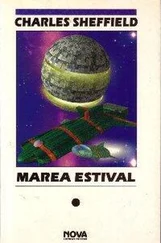Aftermath
by Charles Sheffield
From the secret diary of Oliver Guest.
Entry date: June 14, 2026
The day I died: July 6, 2021. I remember it like yesterday.
I woke up a little after seven, though it might be more accurate to say that in the final night of dreams I never slept. Sometimes I was with my darlings, all my darlings. They were the same age at the same time, as they had never been in life. They would be fourteen years old forever. I would see to that.
But I traveled into nightmares, too, whenever my thoughts drifted forward half a day to imagine my final minutes. No Death Row, of course, and no march to the scaffold, not in these enlightened times; rather, we would stroll together, I and the observers and reporters and admirers and guards, to the Chamber of Morpheus.
What wonderful things words are. Three-quarters of a century ago the suicide flights of the Japanese Air Force became the kamikaze, the Heavenly Wind; today the death cell and sleep without end become the Chamber of Morpheus.
But back to reality. I woke around seven on the morning of my last day, and by eight they were at me again.
This time it was a short, neatly dressed man with a dark beard and a balding, wrinkled brow. He entered the room where I struggled to swallow coffee and toast — this condemned man, at least, ate no hearty breakfast — and he began, “Oliver Guest—”
“Do I know you?”
“We have never met, no. I am Father Carmelo Diaz.”
“I specifically said, no priests. I was promised no priests.”
“I know. It is not as a priest that I come here.”
An obvious falsehood. A true priest can no more decide to be a nonpriest than a fish can decide to live out of water. But he went on with something of greater possible interest, “I carry with me an offer from the Governor.”
“Let me see it.”
He shook his head. “Although I have the offer with me in writing, I would rather first discuss it with you orally.”
“No. Let me look at it. Then maybe we will talk.”
With apparent reluctance, he reached into an inside pocket and handed over a thin packet of papers. Official state seal. Governor’s official letterhead, and below it a certification that Carmelo Diaz was empowered to meet with Oliver Guest and negotiate on behalf of the state. And, finally, an outline of the terms of the offer.
While I was reading, I felt sure that Carmelo Diaz’s eyes were in constant motion, flickering from me to walls, to floor, to ceiling, and finally — irresistibly — back to me.
I didn’t have to watch Diaz to know this. I had seen the same behavior in a hundred visitors. They were intrigued — and some offended — by the apparent opulence of my living quarters. The furnishings were massive, immovably attached to the floor, and finished in soft and expensive leather. The walls, all the way up to the ten-foot ceiling, were covered in rich dark red velvet. Shoes sank deep into the pile of the soft carpet. The lamps, all ceiling inlaid, could dim or brighten at the touch of a button.
Less obvious — not obvious at all to me, until I did my own experiments — was the room’s harmless nature. Harmless, in the specific sense that a person in the room would find nothing to permit self-damage or self-slaughter. Left to explore the room, as I had been free to explore it, any visitor would finally conclude that everything was innocuous with the exception — the eyes of Carmelo Diaz, ever and always, came back to me — of the occupant.
I had no pen, of course, to sign anything. Nor would he have. Guards would be brought in to provide a writing instrument if we reached some kind of agreement.
That was a large if. I folded the three sheets of paper and handed them back to Diaz.
“A model of vagueness, if you don’t mind my saying so. The state wishes me to give certain specific information. If I provide it, then certain vague concessions will be offered to me as a quid pro quo.”
“It was written that way at my request.” Given the setting, Carmelo Diaz seemed too much at ease. I wondered if he had been here before, dealing with others on the threshold of the Chamber of Morpheus. The innocent blue eyes in that rounded Celtish skull told me nothing. Apparent innocence itself meant less than nothing, and all first impressions based on appearances alone are likely to be deceiving. I, for instance, have features and build that appear somewhat coarse, even loutish, while my nature is both sensitive and finicky.
“No two humans are identical,” he went on. “Your needs and wishes do not match those of the next man. You and I need room to maneuver, a freedom to negotiate.”
“Freedom is hardly a term that I would apply to my situation. Can you offer me freedom?”
“You know that I cannot.” There was a certain blunt charm to Father Carmelo Diaz. I could imagine that, under other circumstances, he might make a fine dinner companion. It must be one factor in his presumed successes.
“So what can you offer me?”
“Why don’t we first confirm what the state asks of you?” And, when I said nothing, “It is really very little. Your trial provided overwhelming evidence that you murdered fifteen people. We wish to know if there were more.”
“What makes you think there might be?”
“The chronological pattern. There are anomalously long gaps between cases five and six, between eight and nine, and between twelve and thirteen.”
“Perhaps I was busy with other matters. I had to earn a living, you know. A man can’t just go on having fun all the time.”
It was said to test him, and I was pleased to see that he did not wince.
“Do you have other suggested victims?” I went on. “It is hardly useful to propose gaps, unless you have people to fill them.”
“I suspect that you, Dr. Guest, know these statistics far better than I do. But let me state them for the record.” It was his first suggestion that we were being recorded, though I of course had assumed it.
“Confining ourselves to this population area alone,” he went on, “an average of thirty thousand fourteen-year-olds run away each year. Most return home in due course, but close to one-sixth of them remain unaccounted for. Of those, let us assume that only one child in a thousand possesses that standard of physical beauty which satisfies your apparent need. There would still be a suitable candidate, every couple of months, whose permanent disappearance would be indistinguishable from all the rest.”
The thing I liked about Carmelo Diaz was his matter-of-fact manner. No weeping and wailing and accusations from him about the “poor, helpless doomed children.” No suggestions that I was the devil incarnate. It made me wonder if, deep inside, he carried the same needs. He was deliberately, and successfully, matching his speech patterns to my own.
I didn’t let any of this influence me. I learned, long ago, how easy it is to find in others a false resemblance to oneself.
“That’s all you are asking?” I said. “If there were others?”
“Well, not quite.” He hesitated. “You chose such beautiful children, such models of physical perfection. We would like to know who the others were, and where their bodies can be found.”
So far it had all been one-sided. Time to change that. “You have told me what you want,” I said. “Now tell me what you can offer in return, were I to give it to you.”
Читать дальше












